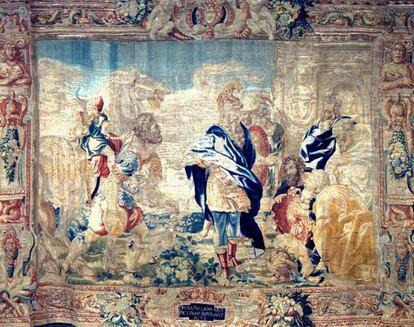Losing the threads?
The archbishop of Madrid and an association for abused women are involved in a legal battle The case revolves around 23 valuable tapestries, and has reached the Supreme Court

The archbishop of Madrid, Antonio María Rouco Varela, is locked in a fierce legal battle with a small association over ownership of 23 valuable Flemish tapestries dating from the 16th and 17th centuries. Five of these include preliminary sketches by Rubens and their value has been estimated at two to three million euros.
The artworks were bequeathed to the Santa Rita de Casia Association in 1869 by a millionaire from Madrid named Victoriana Oliva. The cardinal wants to use the tapestries to decorate the capital's La Almudena cathedral, while the association wants to rent them out for art shows and use the proceeds to help battered women.
The dispute has now reached the Supreme Court following a long and winding journey through the Spanish and Roman courts. It was the canonical courts of Rome that first supported Rouco's unilateral decision in 2004 to declare the Santa Rita Association void. He did so without permission from its members, claiming he had the right to do so because of the association's religious nature. This ignored an order by Queen Isabel II of Spain, who was honorary president of the association in the 1860s, which decreed that the Santa Rita would be a purely civil association from then on.

Rouco moved to terminate the association after a parishioner informed him of the existence of the tapestries. Following the favorable decision by the Supreme Tribunal of the Apostolic Signatura - the highest court in the Catholic Church - the archbishop of Madrid then asked Spanish judges to implement the decision (via a legal instrument known as an exequatur) and force the association to hand over the tapestries.
But a Madrid court rejected Rouco's request and ruled that Santa Rita was very much a civil association - on the royal orders of Isabel II, no less - and therefore its activity was subject to Spanish civil law, not Roman canonical law.
The Church has described me in writing as an acute schizophrenic"
The archbishop never imagined the passion with which the association president would defend the tapestries. "Victoriana Oliva wanted it that way, and she made it crystal clear in her will," says Rosa Barranco, 43, an economist and devotee of St Rita of Cascia, the patron saint of abused women. "She herself was a battered woman who wished for the tapestries to be handled by an association known for aiding the helpless."
Victoriana Oliva was a woman as pious as she was rich; she had servants tending to her needs in her home across from the Casino de Madrid on Alcalá street, where she also owned a tapestry store. Oliva never had any children, and before passing away she wrote a will on April 1, 1869 that stated that "being of sound mind... I am bequeathing the new velvet tapestries from Utrecht to the congregation of Santa Rita... the property of which cannot be transferred..."
But the litigation was far from over. Rouco appealed the decision to the Madrid provincial court, which ruled in his favor. The association has now taken it up with the Supreme Court.
Not content with fighting the followers of Santa Rita, the archbishop has also filed a suit against the Royal Tapestry Factory, which has looked after the tapestries since 1921 and is now restoring them. This institution also considers the association to be their sole owner.
On occasion, the association has rented out the artworks for international exhibitions, charging around 8,000 euros per tapestry. "The money has been used for the association and to help battered women such as Victoriana," notes Barranco, who says she has spent around 50,000 euros of her own money on this legal dispute.
The association president still remembers the day she showed up at a public event attended by the archbishop, who drew away his hand when he found out who she was. "They have gone as far as to describe me in writing as an acute schizophrenic," she says.
The association has also started a petition on Change.org to collect signatures and send them to Pope Francis in the Vatican, requesting him to tell Rouco to "stop harassing us once and for all and stop trying to alter the will of the testator, so that the proceeds from her tapestries can be used to help abused women."
Tu suscripción se está usando en otro dispositivo
¿Quieres añadir otro usuario a tu suscripción?
Si continúas leyendo en este dispositivo, no se podrá leer en el otro.
FlechaTu suscripción se está usando en otro dispositivo y solo puedes acceder a EL PAÍS desde un dispositivo a la vez.
Si quieres compartir tu cuenta, cambia tu suscripción a la modalidad Premium, así podrás añadir otro usuario. Cada uno accederá con su propia cuenta de email, lo que os permitirá personalizar vuestra experiencia en EL PAÍS.
¿Tienes una suscripción de empresa? Accede aquí para contratar más cuentas.
En el caso de no saber quién está usando tu cuenta, te recomendamos cambiar tu contraseña aquí.
Si decides continuar compartiendo tu cuenta, este mensaje se mostrará en tu dispositivo y en el de la otra persona que está usando tu cuenta de forma indefinida, afectando a tu experiencia de lectura. Puedes consultar aquí los términos y condiciones de la suscripción digital.








































